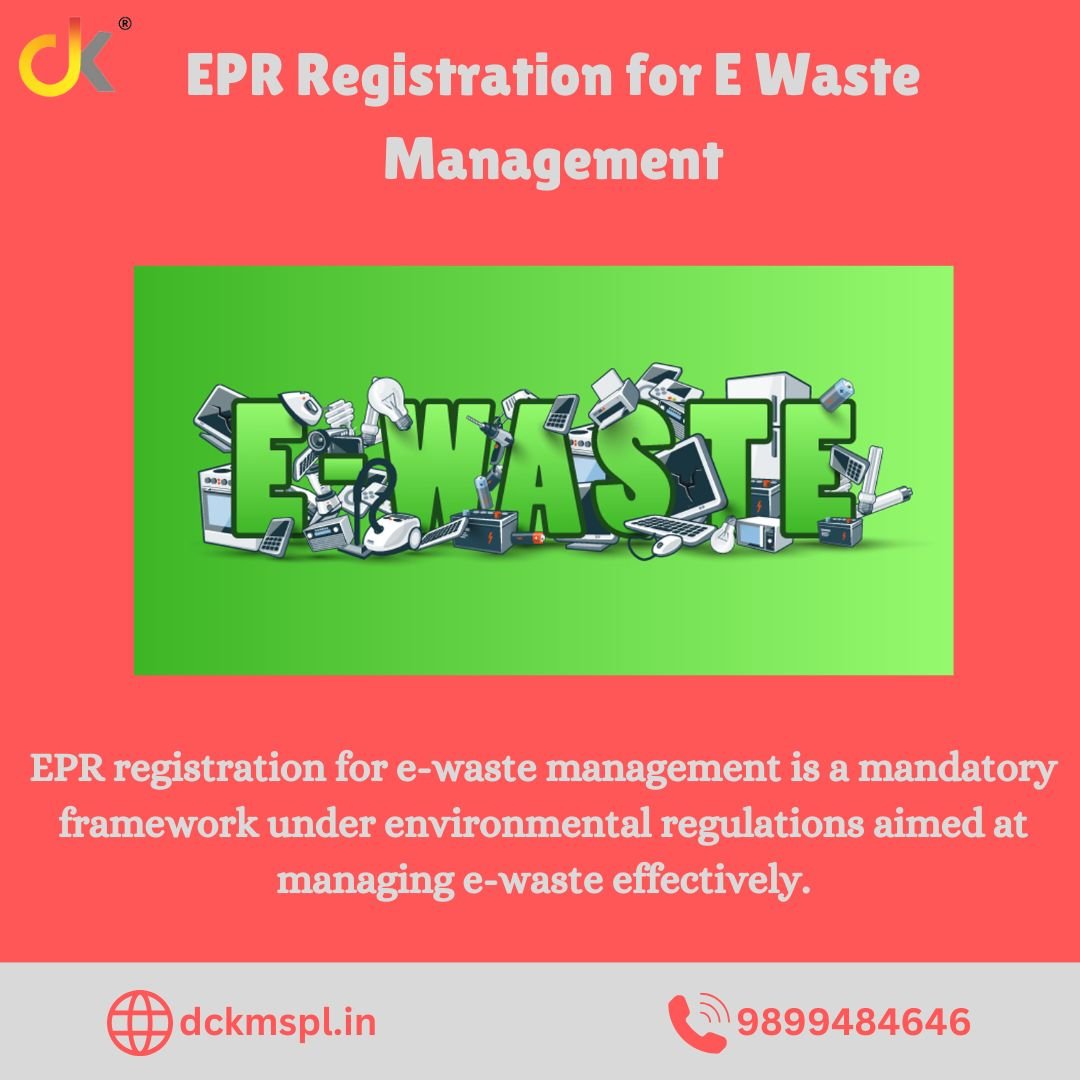E-waste, or electronic waste, is one of the fastest-growing waste streams globally. With the increasing reliance on electronic devices, the need for sustainable e-waste management has become paramount. Extended Producer Responsibility (EPR) is a regulatory framework designed to address this challenge by holding producers accountable for the environmental impact of their products throughout their lifecycle. This article explores the significance of EPR registration for e-waste management, the process involved, and the benefits it offers for businesses and the environment.
Understanding EPR Registration for E-Waste Management
EPR registration for e-waste management is a producer-centric approach aimed at ensuring the safe disposal of electronic products once they reach the end of their useful life. It mandates that producers, importers, and brand owners take responsibility for collecting, recycling, and safely disposing of e-waste generated by their products. EPR registration is the first step in complying with these regulations, as it formalizes a company’s commitment to managing e-waste sustainably.Governments across the world, including India, have implemented EPR policies to combat the environmental hazards posed by improper e-waste disposal. These policies are particularly crucial for managing toxic substances such as lead, mercury, and cadmium, which are commonly found in electronic devices and pose significant health risks if not handled correctly.
The EPR Registration Process
EPR registration involves a structured process that ensures businesses adhere to legal requirements for e-waste management. Here’s a step-by-step overview:
- Understanding Regulatory Requirements
Producers must familiarize themselves with the specific regulations outlined by the governing authorities in their country. For instance, in India, the Central Pollution Control Board (CPCB) oversees EPR registration for e-waste under the E-Waste (Management) Rules, 2016. - Documentation Preparation
Companies must prepare the necessary documents, including proof of business registration, product details, and a comprehensive e-waste management plan. The plan should outline the mechanisms for collecting, recycling, and disposing of e-waste. - Application Submission
The application, along with the required documents, is submitted to the relevant regulatory body. Many countries now provide online platforms for EPR registration, simplifying the process for businesses. - Approval and Certification
Once the application is reviewed and approved, the company receives an EPR certificate, enabling it to operate in compliance with e-waste management laws. - Implementation of EPR Plan
Post-registration, businesses must implement their e-waste management plan. This involves setting up collection points, partnering with authorized recyclers, and raising consumer awareness about responsible disposal practices.
Benefits of EPR Registration
EPR registration is not just a regulatory obligation; it offers several advantages for businesses and the environment:
- Environmental Protection
Proper e-waste management prevents hazardous substances from contaminating soil, water, and air. By promoting recycling and resource recovery, EPR contributes to reducing the ecological footprint of electronic products. - Regulatory Compliance
EPR registration ensures that businesses comply with legal requirements, avoiding hefty penalties and legal complications. It also enhances transparency in e-waste handling processes. - Corporate Social Responsibility (CSR)
By adopting EPR practices, businesses demonstrate their commitment to sustainability, aligning with global environmental goals. This enhances their reputation as socially responsible entities. - Economic Benefits
Recycling and recovering valuable materials from e-waste, such as metals and plastics, can significantly reduce production costs. EPR systems also create opportunities for innovation in product design to minimize waste generation. - Consumer Trust
Consumers are increasingly prioritizing eco-friendly brands. EPR registration signals a company’s dedication to environmental stewardship, fostering trust and loyalty among customers.
Challenges in EPR Implementation
Despite its benefits, EPR registration comes with challenges that businesses must navigate:
- Complex Regulations
Different countries have varying EPR rules, making it challenging for multinational corporations to align their practices across regions. - Cost Implications
Setting up collection systems and ensuring compliance can be expensive, particularly for small and medium-sized enterprises. - Limited Awareness
Many producers and consumers lack awareness of their roles in e-waste management, hindering the effectiveness of EPR initiatives. - Infrastructure Gaps
Inadequate recycling facilities and authorized waste handlers can slow down the implementation of EPR systems.
Role of Producers in EPR
Producers play a pivotal role in the success of EPR for e-waste management. Their responsibilities include:
- Designing products with recycling and reuse in mind.
- Educating consumers about the importance of responsible e-waste disposal.
- Collaborating with recyclers and waste management organizations to ensure safe processing of e-waste.
Future of EPR in E-Waste Management
As technology advances and the volume of e-waste continues to grow, the importance of EPR will only increase. Governments are likely to introduce stricter regulations, encouraging businesses to innovate and adopt sustainable practices. Furthermore, advancements in recycling technologies and the development of a circular economy will enhance the efficiency of EPR systems.
Conclusion
EPR registration for e-waste management is a crucial step towards achieving environmental sustainability in an increasingly digital world. It ensures that businesses take responsibility for the entire lifecycle of their products, from production to disposal. While challenges remain, the benefits of EPR in reducing environmental pollution, promoting recycling, and fostering corporate responsibility are undeniable. By embracing EPR registration, companies not only comply with regulations but also contribute to a greener, more sustainable future.
